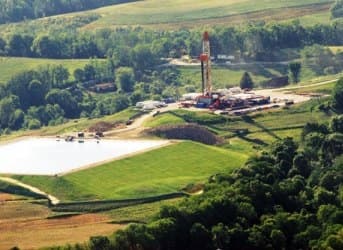One of the major North American energy success stories over the past decade has been the massive rise of U.S. natural gas production as a result of the hydraulic fracturing process, increasingly referred to in journalistic shorthand as “fracking.”
The technique is not without its critics, who allege that energy companies a) inject a toxic brew of substances into their boreholes to expedite the procedure, and b) in turn, risk polluting underground water resources and aquifers. Accordingly, as the U.S. government has yet to intervene on regulating the process, a number of states have passed rulings at worst, imposing moratoriums on the procedure, or requiring more data input.
It is a measure of the technique’s success that its usage has now spread north of the border, but the downside for proponents is that Canada’s Quebec province has banned the procedure for present.
Which has run afoul of Quebec’s fracking advocates, who are now using a novel legal defense in an attempt to overturn the prohibition, the North American Free Trade Agreement, signed in 1994.
NAFTA was designed to promote inter-hemispheric trade between Canada, the United States and Mexico to create a trilateral trading community in northern America. The agreement ended tariffs on various goods and services to implement trading equality between Canada, the U.S. and Mexico.
Related Articles: Europe Rejects Proposal to Ban Hydraulic Fracking
Now, a U.S. firm is using a NAFTA argument to protest Quebec’s fracking ban.
Lone Pine Resources Inc., headquartered in Calgary but incorporated in Delaware, has revealed in a filing with the U.S. Securities and Exchange Commission this week that on 8 November it filed a notice of intent to sue the Canadian government under NAFTA’s Chapter 11 and would seek $250 million in damages.
At issue? NAFTA Chapter 11 allows U.S. and Mexican companies to sue Canada if they assert that they have been abused by a Canadian government policy.
The contentious project has engendered much legal criticism, as opponents note that investor protections in NAFTA give business investors new power over sovereign nations and provide a new, broader definition of property rights. Under NATFA’s Chapter 11, a “regulatory takings” clause designates intangible property, such as a corporation’s potential future profits, as considered private property, under which any law or regulation that is imposed within the NAFTA zone to protect the public interest could be considered as “taking” and impeding that corporation’s earning potential, leaving the government to compensate the corporate owners for lost property or profit.
Lone Pine’s lawsuit is based upon Quebec’s June 2011 legislation that not only imposed a fracking drilling moratorium, but also cancelled permits for oil and gas activity in areas directly below the waters of the St. Lawrence River including the revoking of a Lone Pine permit covering 33,460 acres.
Related Articles: How Big a Role Will Shale Gas Play in America’s Energy Future?
Toronto lawyer Milos Barutciski, representing Lone Pine, while admitting that the Quebecois administration has the legal mandate to regulate shale-gas exploration and impose a moratorium nevertheless does not have the authority to retract mining licenses, telling journalists, “It just can’t, for political reasons, expropriate our property. And that’s exactly what NAFTA’s investor-rights provision is intended to protect.”
Leaving the window open for negotiations, Barutciski added that Lone Star would continue talking to the Quebecois government and authorities in Ottawa to resolve the issue, but added that Lone Star filed the NAFTA claim so it could get the legal process underway.
The case will no doubt preoccupy the best (and most highly paid) legal minds of the North American continent for a number of reasons, quite aside from and beyond the generous legal fees that the case will engender.
ADVERTISEMENT
Stripped of its legalese, the Lone Pine lawsuit represents a potential groundbreaking precedent on provincial, national and international issues.
Do provincial states in the U.S. and Mexico have the legal grounds to uphold regional legislation that might conflict with the supranational terms of an international treaty such as NAFTA? If they do not, then does this mean that corporations in effect have rights that supersede provincial, state, or national concerns?
Accordingly, not only lawyers, but North American governments, will be closely watching the outcome of this case, which has nearly completely flown under the media radar.
By. John C.K. Daly of Oilprice.com



















It is time to END the fossil fuel industry by political power....and replacing it by government owned power infrastructures that tap the earth's IONOSPHERE - as all good and wise geo-scientists know is technically possible.
Civilization regressions is beginning and will speed up if nothing is done.
This is just a way to kill the oil and gas bussiness.
A well will not produce if it is not fracked.
Also people act like there is a big cave down there and if you pump the oil out it causes earthquacks. The sand the oil is in is very hard and packed. That is why the process is called fracturing.
Fracturing is truly not 'dangerous'. It truly doesn't contaminate aquifers. It does not cause any sort of human health issues. That's the reality.